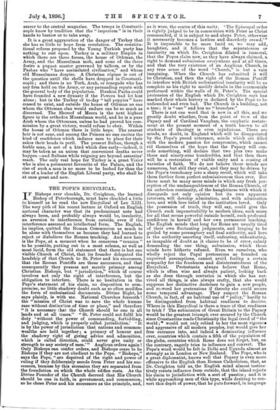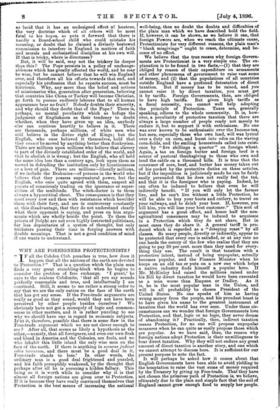THE POPE'S ENCYCLICAL.
IF Bishops ever chuckle, Dr. Creighton, the learned Bishop of Peterborough, must have chuckled a little to himself as he read the new Encyclical of Leo XIII. The very pith of his recent lecture at Oxford on English national character was that its predominant note had always been, and probably always would be, insularity, an aversion to interference from outside, even if the interference assumed an intellectual form. The English, he implies, quitted the Roman Communion as much to be alone with themselves as because they had learned to reject or disbelieve the Roman teaching. And now here is the Pope, at a moment when he conceives "reunion" to be possible, putting out in a most solemn, as well as most lucid, form the old statement that there is but one visible Church of Christ, that its founder delegated the headship of that Church to St. Peter and his successors, that the Roman Pontiffs are those successors, and that consequently they possess not merely primacy among Christian Bishops, but "jurisdiction," which of course involves not only the right of interference, but the obligation to interfere. There is no hesitation in the Pope's statement of his claim, no disposition to com- promise, no little shadowy doubt such as so often modifies the form of ecclesiastical documents. Divine Right, he says plainly, is with me. National Churches forsooth ! the "mission of Christ was to save the whole human race without distinction of time or place," and therefore "it is necessary I hat the Church should be one in all lands and at all times." "St. Peter could not fulfil his duty without the power of commanding, forbidding, and judging, which is properly called jurisdiction: It is by the power of jurisdiction that nations and common- wealths are held together ; a primacy of honour and the shadowy right of giving advice and admonition, which is called direction, could never give unity or strength to any society of men." Anglican orders again! Only Bishops can confer orders, and Bishops cease to be Bishops if they are not obedient to the Pope. "Bishops," says the Pope, "are deprived of the right and power of ruling if they deliberately secede from Peter and his suc- cessors, because by this secession they are separated from the foundation on which the whole edifice rests. As the Divine Founder of the Church decreed that His Church should be one in faith, in government, and communion, so he chose Peter and his successors as the principle, and, as it were, the centre of this unity. The Episcopal order is rightly judged to be in communion with Peter as Christ commanded, if it is subject to and obeys Peter, otherwise it necessarily becomes a lawless and disorderly crowd.'" It is impossible to be more lucid or, we may add, haughtier, and it follows that the separateness or insularity on which Dr. Creighton dilated is immoral, that the Popes claim now, as they have always claimed, a right to demand submission everywhere and at all times, and that the very existence of an Anglican Church, in any true sense of the word "Church," is but a vain imagining. When the Church has submitted it will be Christian, and then the right of the Roman Pontiff to interfere with British ecclesiastical insularity will be as complete as his right to modify details in the ceremonials performed within the walls of St. Peter's. The special pretension of the English which Dr. Creighton says has marked their whole history is declared by the Pope to be unfounded and even bad. The Church is a building, not a tree; it is " one " and has no "branches."
There is not one word that is new in all this, and we greatly doubt whether, from the point of view of the Papacy and of Cardinal Vaughan, the emphatic restate- ment at the present moment of a truth known to all students of theology is even injudicious. There are minds, no doubt, in England which will be disappointed by the Pope's proud utterance, minds which are filled with the modern passion for compromise, which cannot rid themselves of the hope that the Papacy will con- cede something, will declare that two plus two make three and ninety-nine hundredths, and that then there will be a restoration of visible unity and a ceasing of varieties of faith. We do not believe those minds are numerous, but still they exist, and they may be driven by the Pope's trenchancy into a sharp recoil, which will take them further from perfect submissiveness than ever. But there must be many more minds in which any fresh per- ception of the unchangeableness of the Roman Church, of its unbroken continuity, of the haughtiness with which it disregards not only opinion but its own apparent interests, will develop admiration, and with admiration love, and with love belief in the institution loved. Only the possession of truth, they will say, could give the Church such impenetrability to modern ideas, such scorn for all that seems powerful outside herself, such profound confidence in herself and her own permanent teaching. The English minds that long for Rome are usually tired of their own fluctuating judgments, and longing to be guided by some peremptory and final authority, and hero is the authority asserting itself, unfearing, unhesitating, as incapable of doubt as it claims to be of error, calmly demanding the one thing, submission, which those minds have hitherto refused. Even we ourselves, who wholly reject the Papal pretensions as founded on unproved assumptions, cannot avoid feeling a certain sympathy for the frankness and disinterestedness of the Encyclical. Protestants always believe that Rome, which is often wise and always patient, looking back as she does through centuries in which she has sur- vived all things, is also always crafty, that she would suppress her distinctive doctrines to gain a new people, and re-word her pretensions if thereby she could secure some temporal advantage. They suspect the Roman Church, in fact, of an habitual use of "policy," hardly to be distinguished from habitual readiness to deceive. Where in this Encyclical is there a trace of that readiness to trick ? The submission of Great Britain to the Papacy would be the greatest triumph ever secured by the Church since Constantine made Christianity the legal creed of "the world;" would not only rebind to her the most vigorous and aggressive of all modern peoples, but would give her free entrance into, and indeed a dominating influence over, countries which contain a fifth of the population of the globe, countries which Rome does not forget, but, on the contrary, eagerly tries to influence and convert. The Pope's word would be felt in Delhi and Uganda almost as strongly as in London or New Zealand. The Pope, who is a great diplomatist, knows well that Popery is even more offensive to the English than Roman Catholicism, that, as Dr. Creighton told us, the English mind almost instinc- tively resists influence from outside, that the island rejects his claim to jurisdiction with a sort of passion ; and it is while approaching men of this type, while desiring to con- vert this depOt of power, that he puts forward, in language so lucid that it has an undesigned effect of hauteur, the very doctrine which of all others will be most fatal to his hopes, so puts it forward that there is hardly a Board-school child who could mistake his meaning, or doubt that he claimed a divinely bestowed commission to interfere in England in matters of faith and morals and ecclesiastical discipline at his own will. If that is tricky, where is directness ?
But, it will be said, may not the trickery lie deeper than this ? The Pope persists in a policy of unchange- ableness which has greatly affected the world, and he may be wise, but he cannot believe that he will win England over, and therefore all his efforts towards that end, and especially his profession that he expects success, must be histrionic. Why, any more than the belief and. actions of missionaries who, generation after generation, believing that countries like China or Turkey will become Christian, go forth to pursue endlessly labours that to all human appearance bear no fruit ? Nobody doubts their sincerity, and why should they doubt that of the Pope ? There is, perhaps, no mental peculiarity which so befogs the judgment of Englishmen as their tendency to doubt whether, when they have given up an idea, anybody -else can continue heartily to believe in it. There are thousands, perhaps millions, of white men who still believe in the divine right of Kings ; but the English, who once believed it themselves, hold that they cannot be moved by anything better than flunkeyism. There are millions upon millions who believe that slavery part of the divinely established order of the world, and -that to abolish it is wrong ; but the English, who all held the same idea less than a century ago, look upon them as -moved in defending the institution only by licentiousness or a love of gain. There are millions—literally millions, if we include the Brahmins—of persons in the world who telieve that they possess supernatural power, but the English, who once quite agreed with them, suspect all priests of consciously trading on the ignorance or super- stition of the multitude. The witch-doctor is to them always a hypocritical cheat. The consequence is that they meet every now and. then with resistances which bewilder ,them with their fury, and are in controversy constantly at this disadvantage, that they do not understand clearly what their opponent is saying, and press on him argu- ments which are wholly beside the point. To them the priests of Delphi are not even highly instructed politicians, far less depositaries of a system of thought, but only tricksters passing their time in forging answers with double meanings. That is not a good condition of mind if one wants to understand.











































 Previous page
Previous page